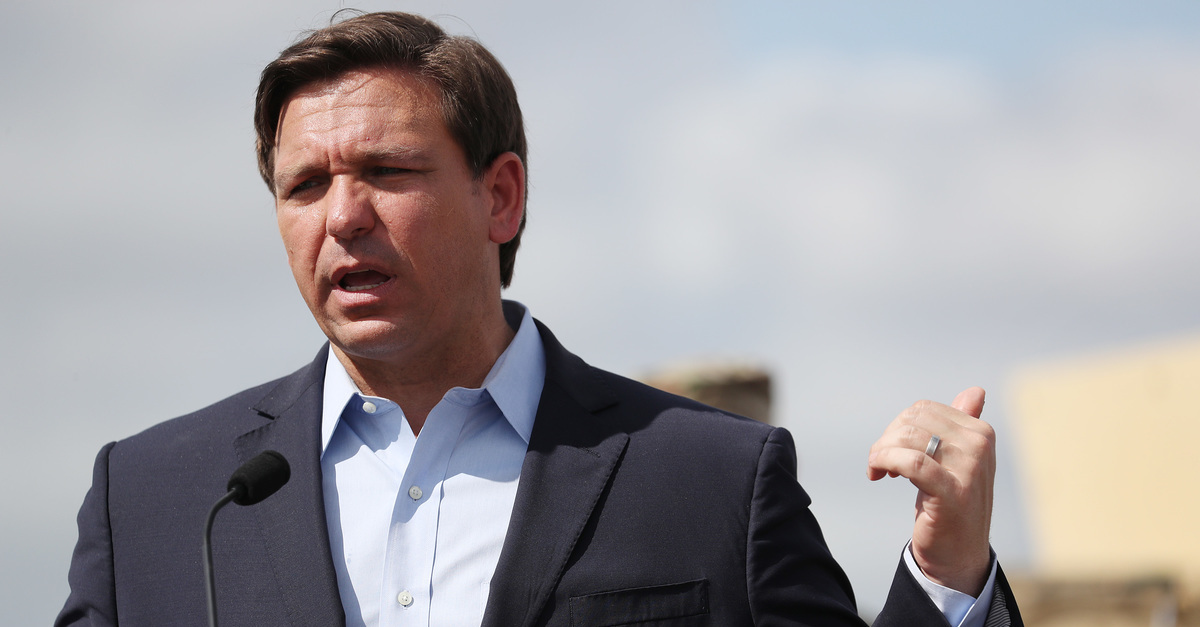
The Republican-governed state of Florida is fighting to prevent ex-felons from voting until fines and fees associated with their convictions have been paid in full. Those efforts have cost Florida taxpayers nearly $2 million and may ultimately cost hundreds of thousands more than that, the Orlando Sentinel reported on Thursday.
The Sentinel said that taxpayers have so far spent upwards of $1.7 million on Gov. Ron DeSantis’s (R) litigation over Amendment 4. Existing contracts, if paid in full as expected, would add up to more than $2.3 million:
Gov. Ron DeSantis’ administration has authorized more than $2.3 million in contracts with private lawyers, including a $265,000 agreement with Washington, D.C.-based Cooper & Kirk PLLC law firm, to represent the state in a federal appeals court, the records show.
Florida’s 2018 Amendment 4, which passed with more than 65 percent of the vote, automatically restored voting rights to ex-felons who had “completed all of the terms of their sentences.” The measure was initially expected to return the vote to as many as 1.5 million Floridians. The governor’s lawyers argue that completing all terms of the sentence includes all fines and fees; opponents say that such a condition amounts to an unconstitutional “poll tax,” especially in cases where an individual is unable to pay.
A group of plaintiffs represented by the ACLU sued, arguing that conditioning voting on payment of fines violates the 24th Amendment’s guarantee against poll taxes.
After a trial, U.S. District Judge Robert Hinkle—a Bill Clinton appointee—ruled in favor of plaintiffs, calling Florida’s law a “pay-to-vote system.” DeSantis appealed the Eleventh Circuit. After a three-judge panel in February ruled that Florida couldn’t keep indebted ex-felons from voting, the full panel of judges on the Eleventh Circuit Court agreed to rehear an appeal in the case.
“The District Court gave this case the careful consideration mandated by the important right at stake, and properly concluded that Florida’s requirement that felons pay fees and costs associated with their case to be eligible to vote is properly classified as a tax,” opponents of the law have argued. “That ends the inquiry, since it is beyond question that the Twenty-fourth Amendment prohibits such a tax as a precondition to voting in a federal election—which is precisely what Florida has done.”
A 10-member panel of the U.S. Court of Appeals for the Eleventh Circuit heard oral arguments on Aug. 18.
Oral arguments, which were conducted via Zoom, touched not only on the general characterization of ex-felons’ obligations to pay fines, but also on the practical considerations at play. Some felons, the plaintiffs argued, are not even aware that they owe a fine; they maintained that Florida lacks any central database through which a felon registering to vote could check outstanding obligations.
U.S. Circuit Judge Beverly Martin, a Barack Obama appointee, said the state of Florida “has shown a staggering inability” to manage and communicate accurate information about fines to the individuals affected. Charles Cooper, a lawyer representing Governor DeSantis, admitted, according to Courthouse News’s account, that “Florida did not get its act together as quickly as we would have hoped.”
Despite that, Cooper argued, “The remedy is not to throw out the financial obligations out the window.”
Cooper controversially suggested that individuals should simply register to vote, even without being certain that financial obligations were satisfied. The voter registration process, Cooper said, would trigger a state investigation into eligibility. U.S. Circuit Judge Jill Pryor, also an Obama appointee, said there was a potential problem with Cooper’s logic: it could constitute perjury.
Circuit Judge Pryor said that a person registering and attesting as required might have “represented that they paid all fees under penalty of perjury, even though they have no idea.”
Half of the Circuit Judges that heard the case were appointed by President Donald Trump. At least one of them appeared to openly agree with Gov. DeSantis’s arguments, the Tampa Bay Times reported:
One exception was Judge Barbara Lagoa, who, along with Judge Robert Luck, was appointed to the court by Trump after Gov. Ron DeSantis named them to the Florida Supreme Court last year.
Lagoa asked many questions that indicated she agreed with DeSantis’ position on Amendment 4, passed by Floridians in 2018 that wiped away the state’s Jim Crow-era ban on voting by people convicted of felonies.
At one point, Lagoa questioned whether the court, if it finds parts of Amendment 4 unconstitutional, shouldn’t simply void the entire amendment.
With election season increasingly near, it’s unclear when the full Eleventh Circuit will hand down its ruling. In the end, this may be an issue for the U.S. Supreme Court to decide, which could drag this fight out past November.
Jerry Lambe and Elura Nanos contributed to this report.
[Image via Joe Raedle/Getty Images]
Have a tip we should know? [email protected]